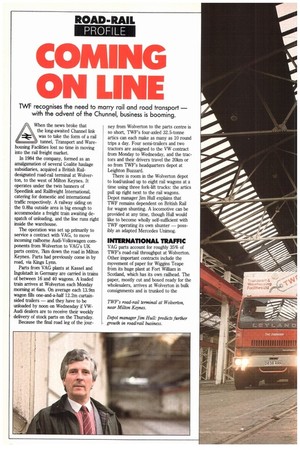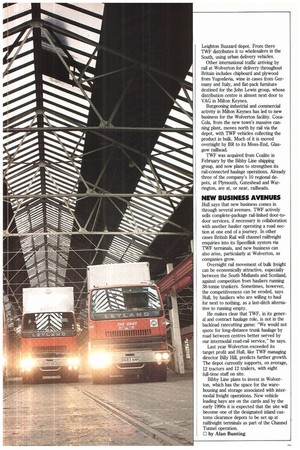COMING ON LINE
Page 68

Page 69

If you've noticed an error in this article please click here to report it so we can fix it.
TVVF recognises the need to marry rail and road transport — with the advent of the Chunnel, business is booming.
When the news broke that the long-awaited Channel link was to take the form of a rail tunnel, Transport and Warehousing Facilities lost no time in moving into the rail freight market.
In 1984 the company, formed as an amalgamation of several Coalite haulage subsidiaries, acquired a British Raildesignated road-rail terminal at Wolverton, to the west of Milton Keynes. It operates under the twin banners of Speedlink and Raillreight International, catering for domestic and international traffic respectively. A railway siding on the 0.8ha outside area is big enough to accommodate a freight train awaiting despatch of unloading, and the line runs right inside the warehouse.
The operation was set up primarily to service a contract with VAG, to move incoming railborne Audi-Volkswagen components from Wolverton to VAG's UK parts centre, 71(rn down the road in Milton Keynes. Parts had previously come in by road, via Kings Lynn.
Parts from VAG plants at Kassel and Ingolstadt in Germany are carried in trains of between 16 and 40 wagons. A loaded train arrives at Wolverton each Monday morning at 6am. On average each 13.9m wagon fills one-and-a-half 12.2m curtainsided trailers — and they have to be unloaded by noon on Wednesday if VWAudi dealers are to receive their weekly delivery of stock parts on the Thursday, Because the final road leg of the jour ney from Wolverton to the parts centre is so short, TWF's four-axled 32.5-tonne artics can each make as many as 10 round trips a day. Four semi-trailers and two tractors are assigned to the VW contract from Monday to Wednesday, and the tractors and their drivers travel the 20km or so from TWF's headquarters depot at Leighton Buzzard.
There is room in the Wolverton depot to load/unload up to eight rail wagons at a time using three fork-lift trucks: the artics pull up right next to the rail wagons. Depot manager Jim Hull explains that TWF remains dependent on British Rail for wagon shunting. A locomotive can be provided at any time, though Hull would like to become wholly self-sufficient with TWF operating its own shunter — possibly an adapted Mercedes Unimog.
INTERNATIONAL TRAFFIC
VAG parts account for roughly 35% of TWF's road-rail throughput at Wolverton. Other important contracts include the movement of paper for Wiggins Teape from its huge plant at Fort William in Scotland, which has its own railhead. The paper, mostly cut and boxed ready for the wholesalers, arrives at Wolverton in bulk consignments and is trunked to the Leighton Buzzard depot. From there TWF distributes it to wholesalers in the South, using urban delivery vehicles.
Other international traffic arriving by rail at Wolverton for delivery throughout Britain includes chipboard and plywood from Yugoslavia, wine in cases from Germany and Italy, and flat-pack furniture destined for the John Lewis group, whose distribution centre is almost next door to VAG in Milton Keynes.
Burgeoning industrial and commercial activity in Milton Keynes has led to new business for the Wolverton facility. CocaCola, from the new town's massive canning plant, moves north by rail via the depot, with TWF vehicles collecting the product in bulk. Much of it is moved overnight by BR to its Moss-End, Glasgow railhead.
TWF was acquired from Coalite in February by the Bibby Line shipping group, and now plans to strengthen its rail-connected haulage operations. Already three of the company's 10 regional depots, at Plymouth, Gateshead and Warrington, are at, or near, railheads.
NEW BUSINESS AVENUES
Hull says that new business comes in through several avenues. TWF actively sells complete-package rail-linked door-todoor services, if necessary in collaboration with another haulier operating a road section at one end of a journey. In other cases British Rail will channel railfreight enquiries into its Speedlink system via TWF terminals, and new business can also arise, particularly at Wolverton, as companies grow.
Overnight rail movement of bulk freight can be economically attractive, especially between the South Midlands and Scotland, against competition from hauliers running 38-tonne trunkers. Sometimes, however, the competitiveness can be eroded, says Hull, by hauliers who are willing to haul for next to nothing, as a last-ditch alternative to running empty.
He makes clear that TWF, in its general and contract haulage role, is not in the bacIdoad ratecutting game: "We would not quote for long-distance trunk haulage by road between centres better served by our intemiodal road-rail service," he says.
Last year Wolverton exceeded its target profit and Hull, like TWF managing director Billy Hill, predicts further growth. The depot currently supports, on average, 12 tractors and 12 trailers, with eight full-time staff on site.
Bibby Line plans to invest in Wolverton, which has the space for the warehousing and storage associated with intermodal freight operations. New vehicle loading bays are on the cards and by the early 1990s it is expected that the site will become one of the designated inland customs clearance depots to be set up at railfreight terminals as part of the Channel Tunnel operation.
1:1 by Alan Bunting
















































































































